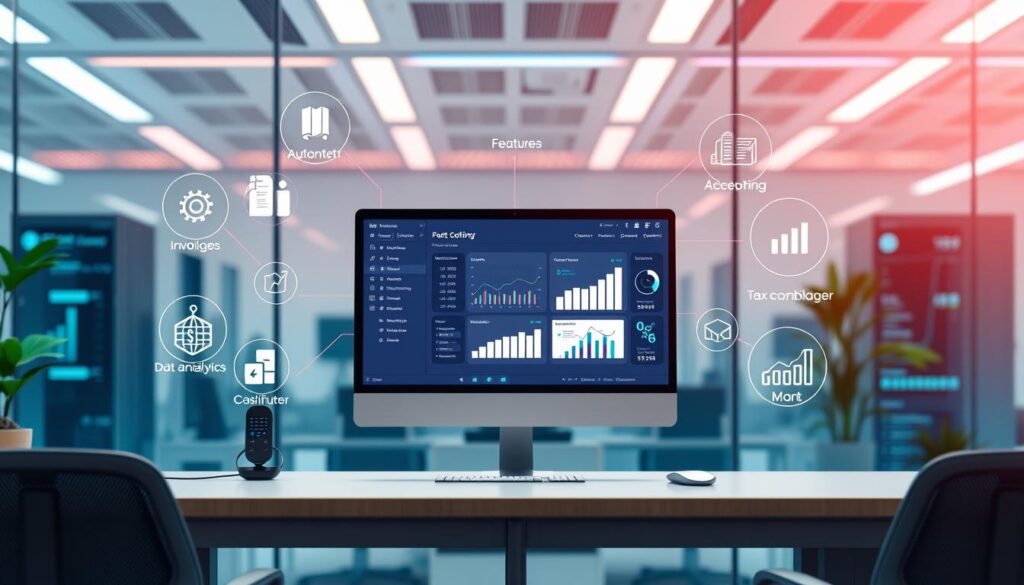Imagine making your small business’s finances better without all the old-school bookkeeping hassle. Today, small business owners can break free from traditional accounting limits. The best ai accounting software is not just a dream; it’s a real change for entrepreneurs.
We’ll see how ai financial software brings big solutions for small businesses. It cuts down on mistakes and lets you make decisions fast, like magic. With small business ai accounting tools, managing money is easier and helps your business grow. AI handles everything from sorting out transactions to predicting the future and keeping up with rules.
Table of Contents
Key Takeaways
- Advanced Automation: AI accounting tools do more than basic bookkeeping, making tough financial tasks easier.
- Real-time Insights: Get instant financial analysis, key for making quick, smart business choices.
- Customization and Growth: Tools are made to fit your business, helping it grow and run smoothly.
- Cost-Effective Solutions: Find software plans starting at $69 a month, making top tech affordable.
- Free Trials and Discounts: Deals like Xero’s 90% off for 6 months make switching to AI software easy on the wallet.
- Highly Rated Platforms: Trustworthy platforms like Intuit QuickBooks Online and FreshBooks get great reviews.
- Innovative Tools for Compliance: AI software like Blue Dot helps with tax rules, helping businesses worldwide get more back.
Understanding the Role of AI in Modern Small Business Accounting
The use of artificial intelligence in small business accounting is changing how companies handle their money. This change comes from AI bookkeeping software for small business. It makes accounting faster and more accurate.
Now, automated accounting solutions do more than just enter data. They use AI for smart sorting, predictive analysis, and better decision-making. This technology brings many benefits, like better accuracy, security, and lower costs. These are key for businesses looking to grow.

- 80% of today’s AI-accounting products offer features that automate routine tasks and offer smart analytics.
- AI-driven systems can slash error rates by up to 67%, showing a clear improvement over traditional accounting methods.
- More than 50% improvement in processing times witness among businesses adopting these AI technologies.
But, using AI bookkeeping software for small business comes with its own set of challenges. About 75% of businesses worry about data security. More than 50% also face resistance to change from old ways to new tech.
| Benefit | Percentage of Businesses Reporting |
|---|---|
| Enhanced Decision-Making | 90% |
| Cost Reductions | 85% |
| Improved Customer Engagement | 50% |
Despite these hurdles, the outlook is bright. Over 70% of businesses believe predictive analytics and machine learning will change accounting software. For small businesses, using AI-driven automated accounting solutions is becoming essential.
The world of accounting is changing with new tech. It offers innovative solutions and opens up new areas in managing finances for small businesses.
Key Features to Look for in AI Accounting Software for Small Business

Small businesses looking into AI accounting solutions should focus on key features. These features of AI accounting tools are crucial for better financial management and decision-making. Machine learning accounting software and ai bookkeeping tools can make accounting faster, more accurate, and data-driven.
Businesses should look for features like:
- Real-time data processing for quick insights and actions.
- Advanced analytics for understanding financial trends and predictions.
- Customization to fit the unique needs of a business.
- Scalability to grow with the business.
- High-level security to protect financial data from cyber threats.
The integration of AI accounting software like QuickBooks can automate tasks. This reduces errors and boosts efficiency.
With 80% of CFOs planning to invest more in AI, the trend is clear. AI and machine learning are essential for better financial management in small businesses. Leaders in finance believe AI will greatly change the accounting industry.
Choosing the right machine learning accounting software depends on its alignment with your business goals. It should also fit your financial tasks and integrate well with your systems. This ensures comprehensive financial oversight for modern businesses.
By using ai bookkeeping tools with these features, small businesses lead in innovation and excellence. They stay ahead in a competitive market.
The Impact of Automation and Machine Learning on Accounting
The use of automation in accounting and machine learning impact is changing the financial world. These ai-powered accounting solutions make things faster and more accurate. This gives companies a big edge over their competitors.
We explore how machine learning cuts down on manual work. It also makes financial reports and analysis better. This marks a big change in the field.
Reducing Manual Data Entry and Errors
AI is making data entry faster and more reliable. It cuts down on human mistakes. For example, AI in accounting handles data entry, transaction checks, and invoice processing. These tasks used to take a lot of time and effort.
Real-Time Financial Analysis and Reporting
Machine learning makes accounting systems better at quick financial analysis. This lets businesses see their financial health right away. They can then make quick decisions and plans.
These algorithms also help with fast financial tasks. This means businesses can react fast to market changes.
AI also finds problems and fraud quickly. This helps avoid big losses. In places like healthcare and manufacturing, AI tools are very helpful. They make things more accurate and safer.
| Feature | Benefits |
|---|---|
| Automated Data Entry | Reduced time and errors in data processing |
| Real-Time Analysis | Immediate financial insights that inform decision-making |
| Fraud Detection | Quick identification and mitigation of financial anomalies |
| Predictive Analytics | Enhanced forecasting and strategic financial planning |
AI is changing how accounting is done. By using ai-powered accounting solutions, companies get better and faster. This helps them stay on top in a digital world.
These solutions also make advanced financial management easier for more businesses. This opens up new possibilities for financial management.
ai accounting software for small business
As small businesses grow, AI accounting software for small business is key. It changes how we manage money. These tools use automated accounting solutions to make things more accurate and efficient. This lets entrepreneurs focus on their main business instead of bookkeeping.
Bookeeping.ai is a great example. It automates up to 95% of accounting tasks. This saves business owners a lot of time, about 57 hours a month on average. Other tools like Zeni and Docyt also offer good deals, starting at $549 and $299 a month.
AI bookkeeping tools meet different business needs. QuickBooks has a user-friendly interface and a big market share in 2021. Truewind offers advanced AI services but you need to contact them for pricing. There’s a tool for every business size and type.
| Software | Functionality | Automation Level | Cost |
|---|---|---|---|
| Bookeeping.ai | General Accounting | 95% Tasks Automated | Savings: 57 Hours/Month |
| Zeni | Financial Automation for Startups | High | From $549/Month |
| Docyt | Expense Tracking to Bookkeeping | Medium-High | From $299/Month |
| Vic AI | Invoice Processing | Improves productivity by 355% | Contact for Pricing |
| Truewind | AI-Powered Bookkeeping | High | Contact for Pricing |
These examples show how varied AI accounting software for small business can be. From simple automation to advanced AI analysis, the right tool can greatly improve how you work. Cloud-based tools like Fiskl offer features like AI auto-categorization. This saves time and ensures accuracy, which is key for good financial management.
In summary, ai bookkeeping tools bring a lot of value to small businesses. They make complex tasks easier and provide insights for better decision-making and financial planning.
Top-Rated AI Bookkeeping Software for Efficiency and Growth
The use of ai bookkeeping software is changing how small businesses handle their money. It offers strong financial management solutions and gives real-time accounting advice. These tools make operations smoother and give owners the tools for smart financial planning.
Automated Expense Tracking and Management
AI bookkeeping software makes tracking expenses easier by doing it automatically. It sorts out expenses and spots any mistakes, cutting down on manual work and errors. This leads to more accurate records, timely insights, and better cash flow management.
Intuitive Dashboards and Real-Time Decision-Making
These AI systems come with interactive dashboards that show a company’s financial health clearly. They turn complex financial data into easy-to-understand insights. This helps business owners make quick, informed decisions based on up-to-date information.
Now, let’s look at how some top ai bookkeeping software are rated and talked about on major review sites:
| Software | G2 Rating | Capterra Rating | Notable Features |
|---|---|---|---|
| TaxDome | 4.7 | 4.7 | Comprehensive client management, streamlined communication |
| QuickBooks Online | 4.0 | N/A | Automatic transaction categorization, cash flow forecasting |
| Xero | 4.5 | N/A | Real-time financial reporting, easy integration with other business tools |
| AppZen | 4.3 | N/A | AI-driven expense report auditing, compliance checks |
| Sage Intacct | N/A | N/A | Advanced customization, multi-dimensional financial reporting |
This data shows how AI is key in making bookkeeping better and improving financial work. It’s a big help for small businesses looking to succeed in a tough market.
AI-Driven Financial Forecasting and Budgeting Tools
In today’s data-driven world, AI financial forecasting software is key for predicting future finances. It helps companies plan better and use resources wisely. These tools, using predictive analytics in accounting, are more accurate than old methods.
Budgeting tools with AI fit right into current financial systems. They help match financial goals with business plans. Machine learning and data analytics make these tools powerful, automating tasks and analyzing data fast.
It’s important to know what AI tools can do for better financial planning. For example, Cube and Planful are great for planning and predicting finances. They’re perfect for growing businesses. Meanwhile, Datarails FP&A Genius and Mosaic Tech’s ARC AI make complex data easier to understand.
| Software | Key Feature | Starting Price |
|---|---|---|
| Booke.ai | Automates bookkeeping with OCR | $20/month |
| Gusto | Supports budget and payroll management | $40/month |
| Xero | Predictive cash flow analysis | $0.75/month |
| Ramp | AI-driven expense management | Varies |
| Vena Insights | Uses AI for data visualization and predictions | Embedded in Vena |
These tools help businesses predict and adapt to financial changes. They support growth and stability. Companies using predictive analytics in accounting stay ahead and respond well to market changes.
With AI budgeting tools, businesses don’t just survive; they thrive. They make smart decisions based on AI insights, moving forward in today’s fast market.
Enhanced Compliance and Fraud Detection with AI Technology
AI technology is changing how we manage finances. It makes following rules easier and helps catch fraud. This is thanks to AI in accounting and fraud detection systems. These systems use advanced software to watch over finances and prevent risks.
Adherence to Regulatory Standards
AI-driven software is changing how companies follow the law. It helps them keep up with new rules without spending a lot of time or money. This way, AI tools help avoid fines and penalties.
These tools also update quickly when new laws come out. This makes it easier for businesses to stay in line without a hitch.
Risk Mitigation with Predictive Analytics
Predictive analytics are key in fighting fraud. They use lots of data to spot and stop financial threats. This part of AI catches problems early, before they cause big losses.
Machine learning helps these systems get better over time. They learn from past data to fight threats more effectively.
AI helps companies follow rules and catch fraud. This makes finances safer and more efficient. It sets a new standard for managing money in business.
Integration Capabilities: Connecting AI Systems with Existing Software
In today’s fast-paced business world, linking AI systems with current software is key. It helps keep businesses competitive and running smoothly. Good AI systems integration brings together data and offers insights in real time, helping all parts of the business.
Seamless Data Synchronization across Platforms
One big challenge is getting financial data to match across different systems. AI is great at combining data from many sources. It handles millions of transactions quickly and accurately.
This not only cuts down on mistakes but also makes financial reports reliable. They’re ready when you need them for making important decisions.
Extending Functionality Through API Integrations
Using API for AI accounting tools makes these systems much more useful. APIs let AI accounting software work with other business tools. This automates tasks like managing invoices and tracking expenses, boosting efficiency.
By linking AI accounting software with business systems, companies get a unified system. This system supports quick reporting, better data security, and fast financial analysis. It’s essential for using AI insights to grow and improve operations.
| Feature | Benefit |
|---|---|
| Real-time data synchronization | Ensures all financial data across platforms is updated and consistent, enabling accurate reporting and decision-making. |
| Automated task handling | Reduces manual effort in tasks like invoice processing and expense management, significantly cutting down operational costs and time. |
| Advanced security features | Enhances the protection of sensitive financial information through high-level encryption and secure cloud environments. |
| API connectivity | Allows smooth integration with existing systems, maintaining operational continuity and extending software capabilities. |
| Real-time anomaly detection | Identifies irregularities in financial data, facilitating prompt action to mitigate potential risks or fraud. |
Using AI in accounting makes operations smoother and gives businesses an edge. The ability of AI systems to integrate is key for better financial management and staying agile.
Conclusion
Today, choosing AI accounting software is key for small businesses. These technologies change how we handle financial data. They cut down time spent on routine tasks by 80-90% and reduce errors.
With this software, small businesses can see their finances clearly. They can also check cash flow in real-time. This was once only for big companies.
The AI technology benefits go beyond just saving time. They help with compliance, predictive analytics, and detailed financial forecasts. These systems show the future of accounting with AI.
They let businesses predict cash needs months ahead. They can also plan financial scenarios to improve strategies. Almost every small business uses AI in their finances, with 98% using it, surveys show.
Looking ahead, the outlook is bright. 83% of businesses plan to invest in AI. Tools like QuickBooks Online help businesses grow, even in tough times.
Platforms like Envoice show real growth. They double document processing and cut workforce needs in half. AI in accounting is not just a choice. It’s a key strategy for success in today’s complex world.
FAQ
What are the best AI accounting software solutions for small businesses?
The top AI accounting software for small businesses should automate tasks and offer real-time insights. It should also integrate well with your current systems and be easy to use. Look for providers known for their AI advancements in financial software.
How is artificial intelligence changing small business accounting?
AI is changing small business accounting by automating tasks and reducing errors. It gives real-time access to financial data. AI also helps with compliance, forecasting, and decision-making through advanced analytics.
What key features should I look for in AI accounting software?
When looking at AI accounting software, focus on data accuracy and integration with your systems. Customizable reports, scalability, and strong security are also key. An easy-to-use interface and real-time data analysis are important too.
How does automation and machine learning impact accounting practices?
Automation and machine learning reduce manual work and errors. They speed up financial data processing and enable real-time analysis. This leads to better decision-making and risk management.
Why should I consider AI software for my small business accounting needs?
AI software simplifies financial management and optimizes accounting tasks. It provides strategic insights for better business performance. It’s scalable for small businesses and saves time and resources.
How does AI bookkeeping software enhance efficiency and promote business growth?
AI bookkeeping software automates tasks like transaction recording and expense management. It offers real-time visibility and dashboards for quick decisions. It also provides insights for optimizing business operations and growth.
What benefits do AI-driven financial forecasting and budgeting tools offer?
AI-driven tools provide accurate financial projections by analyzing data. They empower business owners to make informed decisions about investments and budgeting. This leads to better strategic planning.
How does AI technology improve compliance and fraud detection in accounting?
AI improves compliance by monitoring transactions and detecting fraud. It uses advanced algorithms to adjust to regulatory changes. This minimizes financial and reputational risk.
What should I look for in the integration capabilities of an AI accounting system?
Look for AI accounting systems with strong integration capabilities. They should sync data smoothly with other software and platforms. API integrations are key to extending functionality and ensuring seamless alignment.
How do I choose the right AI accounting software for my small business?
Choose AI accounting software based on its alignment with your business goals. Consider its compatibility with your existing systems and its security, reliability, and financial management features.
